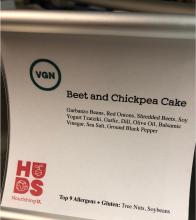Food Allergies & Special Dietary Needs
Visitas Dining with Special Dietary Needs - March 2023
View the recording of our Apri 24, 2023 session during Visitas with information about dining at Harvard with a special dietary need.
Disclaimer
Harvard University Dining Services (HUDS) makes every effort to accommodate the various dietary requirements of our guests. We are committed to stringent food safety measures and to educating our employees about food allergies and intolerances. While we make every effort to avoid allergen cross-contact (e.g. washing hands and changing gloves between each task, using clean pans/utensils for each new menu item during prep, etc.), there is always the potential for cross-contact with other allergen-containing food items, particularly in our self-serve facilities. HUDS encourages guests to speak to the chef or manager regarding any questions about the ingredients contained in the food they are considering. For those with extreme allergen sensitivity, it is highly recommended to order meals in advance with the dining hall management team via email to ensure your meal is free of allergens. This procedure for accessing meals is commonly referred to as the “email method” and can be set up for you during your Disability Access Office (DAO) and HUDS dining accommodation meeting.
What to expect
Our goal at HUDS is to provide you with a safe dining experience that makes it as easy as possible for you to fully engage in the community experience around dining. If you have specific dietary needs and/or food allergies, you should:
- Register and apply for a dining accommodation with the Disability Access Office (DAO) at https://dao.fas.harvard.edu/ several weeks prior to your arrival on campus.
- Attend the dining accommodation meeting with your DAO Advisor and HUDS Management Team to discuss a plan for you to equitably access dining hall options on campus.
- Stay connected with your DAO Advisor and HUDS Management Team through your senior year.
Menu Labeling
Our entire menu is online and we label every dish that contains multiple ingredients in the dining hall. The online menu features the entire ingredient list for a recipe. The labels in the dining halls feature an abbreviated list and include a notation on the bottom designating the major 9 allergens plus alcohol and pork. (See photo on the right for a sample.)
HUDS makes every effort to label its food correctly. However, the number of meals served, and the number of items used, makes it impossible to guarantee the accuracy of its labeling. It is incumbent on every individual with specific dietary needs to make those needs known to their dining hall manager. Self-reporting ensures that all parties have access to the information necessary to keep you healthy and safe. It is also your responsibility to check in with your dining hall managers regarding any concerning ingredients. For further information, please speak with a member of the dining hall management team.


